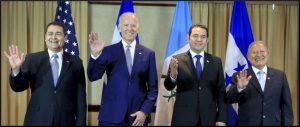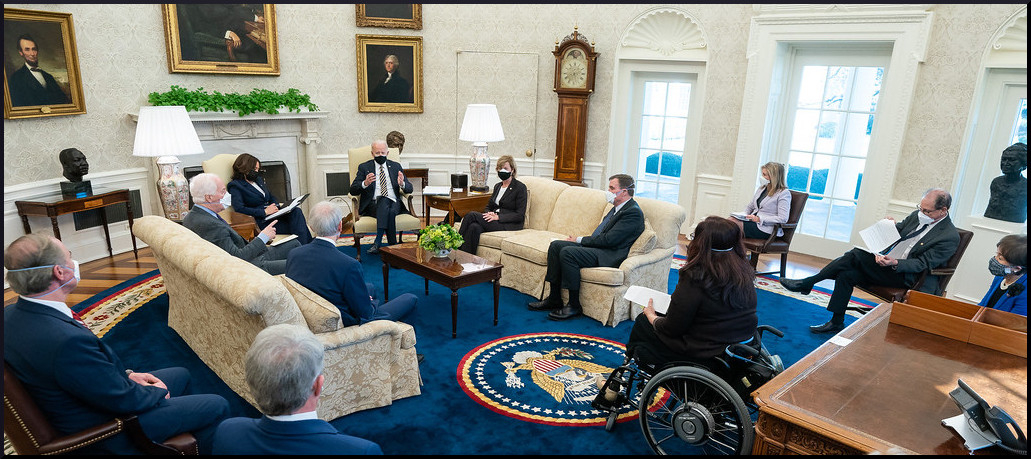by Ben Norton, published on Consortium News, March 10, 2020
The Biden administration has prioritized Central America in its foreign policy, developing a comprehensive plan that pledges $4 billion in funding for the impoverished region, along with foreign corporate investment, in return for aggressive neoliberal “free market” reforms.
According to the Biden administration’s program, Central American governments will be required to cut protections for workers, ensure “that labor practices do not disadvantage competition,” reinforce “free trade” agreements with the United States, and “reduc[e] the barriers to private sector investment,” to allow U.S. corporations more control over the region.
The plan is also explicitly aimed at isolating China and Russia in a bid to consolidate Washington’s control over the region.
Right-wing leaders in Central America have praised the initiative while urging the Biden administration to go further in undermining the region’s last remaining left-wing state, the Sandinista government of Nicaragua.
During a Feb. 17 event at a U.S. government-funded think tank called the Inter-American Dialogue, conservative ex-presidents, vice presidents, and foreign ministers from Central American nations applauded the strategy, which is known informally as the “Biden Plan” or, in Spanish, “Plan Biden.”
The Biden administration’s approach is most immediately aimed at limiting immigration of Central American refugees to the United States. It earned its nickname as “Plan Biden” because it is modeled on another policy the president oversaw during his days in the Senate.
That was Plan Colombia, a counter-insurgency program imposed on Colombia which fueled extreme violence, leading to thousands of deaths and millions of refugees, while exacerbating poverty and inequality in the country.
Grayzone Editor Max Blumenthal investigated the extensive damage that Biden’s neoliberal policies have already wreaked on Central America, when he served as vice president and the point man for the region in the Barack Obama administration. Now that he is president, Biden is repurposing the Obama-era policies and expanding them.
‘Shared Vision’
Following the event at the Inter-American Dialogue, right-wing Central American politicians who participated published a statement declaring that they were “encouraged” by Plan Biden, insisting it will be “mutually beneficial” and part of a “shared vision between the United States government and the Central American region” that will isolate Washington’s adversaries.
The conservative leaders also stoked fears of Chinese and Russian influence, warning that if the United States did not step up its intervention in the region, Beijing and Moscow would fill the void.
A right-wing Nicaraguan opposition figure even called for the U.S. government to treat Central America as a kind of neocolonial proxy, “as it was done in the past for spheres of influences.”
In this sense, Plan Biden is also part of Washington’s new cold war, expressly aimed at strengthening U.S. political and economic influence over Latin America and weakening Central American nations’ growing ties with China and Russia.
At the Feb. 17 event, the conservative Central American leaders similarly called on the Biden administration to turn up the heat on Nicaragua’s democratically elected leftist government. Several politicians half-jokingly referred to conservative U.S.-backed oligarch Cristiana Chamorro as “president” of Nicaragua, refusing to recognize the legitimacy of the country’s elected President Daniel Ortega, whom they trashed as a “dictator.”
A former State Department official under Obama who now works at another U.S. government-funded think tank, and who collaborates closely with the Biden administration, used the event to stress that Biden’s foreign-policy team plans to invest heavily in “civil society” organizations in Latin America in order to serve as proxies for U.S. interests, explaining that NGOs are the “favored interlocutors, in the view of the administration, in developing and implementing its policies in the region.”

While Biden himself has pledged to overturn Donald Trump’s policies, his plans for Central America show that Washington’s bellicose interventionism is going to remain largely the same, but with more emphasis on alliances with right-wing regional leadership.
It was, after all, the Obama-Biden administration that presided over an anti-democratic military coup that overthrew the elected government of Honduras in 2009, installing a corrupt government that has been credibly accused of stealing elections and is heavily involved in drug trafficking.
The discussion of Plan Biden at the Inter-American Dialogue provided a fairly clear indication that the aggressive policies that defined both the Obama and Trump approaches to Central America will continue now that Biden is president.
Pledge with Corporate Strings
During his 2020 presidential campaign, one of the only comprehensive foreign-policy proposals that Joe Biden ran on was a pledge to invest $4 billion in Central America to stem the tide of mass migration. His campaign called the policy, “The Biden Plan to Build Security and Prosperity in Partnership with the People of Central America.”
The Biden Plan is focused primarily on the countries comprising the region’s Northern Triangle – Honduras, El Salvador, and Guatemala – which make up the bulk of Central American immigration to the United States.
The Biden campaign marketed its Central America strategy as a means to reassert power over the region, insisting,
“Renewed U.S. leadership is desperately needed, and must be complemented by private sector investment, the support of the international donor community, and a commitment by regional governments to undertake fundamental reforms.”

Eastern Pacific (Aug. 5, 2003) — During a counter drug operation in the Eastern Pacific, USS Rentz (FFG 46) crew members combat a fire set by suspected drug traffickers in an attempt to escape and destroy evidence. U.S. Navy photo (RELEASED)
“Plan Biden” treats the endemic violence and corruption in Central America not as political problems spawned by the unpopular right-wing regimes propped up by Washington, or as blowback from a U.S. drug war that deported tens of thousands of undocumented gang members to the region in exchange for aid packages, but rather as inconveniences that can be managed through technocratic shortcuts that offer just enough stability for North American corporations to move in.
By reinforcing the neoliberal economic policies that have destroyed local economies across the region, particularly in rural areas, Plan Biden is, ironically, likely to provide further impetus for future generations of impoverished and unemployed Central Americans to migrate north.
Biden’s initiative is based on the “Alliance for Prosperity,” which was launched under former President Barack Obama. His official campaign website proudly referred to the former vice president as “the point-person for the Obama-Biden Administration” on Central America.
In the last year of Obama’s tenure, 2016, Biden helped secure $750 million in funding for the “Alliance for Prosperity Plan.” This was in addition to $560 million in 2015 and $305 million in 2014.
The Obama administration bluntly stipulated that the aid money came with a price tag: In the words of the White House, it put “significant responsibility on the Northern Triangle governments to undertake needed reforms to receive U.S. funds in support of the Alliance for Prosperity Plan.”
The reforms mandated public pressure campaigns to discourage citizens from immigrating to the United States, as well as combating corruption and drug trafficking. But at the heart of the Alliance for Prosperity was the demand that Central American nations impose aggressive structural adjustment policies.

Indeed, “Plan Biden” continues exactly where the Alliance for Prosperity left off. The Biden campaign website states clearly that the “administration will harness private sector investment to promote economic stability and job creation in Central America” by “reducing the barriers to private sector investment” and “improving the competitiveness of the Northern Triangle market.”
This means Central American nations will have to end restrictions they have on foreign corporations dominating their industries and markets, removing any tariffs or economic protectionist measures – exactly the kinds of policies that have devastated local economies in Latin America, fueling poverty, unemployment, and thus mass migration.
“Maximizing our trade and commercial deals also generates greater economic opportunities for U.S. businesses and investors,” the plan stresses. The strategy proposes “private sector investment, including through public-private partnerships, to supplement government funds.”
Moreover, the Biden Plan pledges to direct “the U.S. Trade Representative and the Commerce Department to evaluate whether the countries of Central America are abiding by their commitments under DR-CAFTA,” a reference to the corporate-driven Central America Free Trade Agreement negotiated by the George W. Bush administration in 2004.
The Biden Plan plans to use CAFTA requirements to ensure “that labor practices do not disadvantage competition” – in other words, force Central American nations to cut the few protections, wages and benefits they provide to workers.
 Plan Biden also calls for working with banks that impose neoliberal structural adjustment programs, “such as the World Bank and the Inter-American Development Bank (IDB), to develop infrastructure and promote foreign investment by engaging with the private sector in a cost-effective and competitive manner.”
Plan Biden also calls for working with banks that impose neoliberal structural adjustment programs, “such as the World Bank and the Inter-American Development Bank (IDB), to develop infrastructure and promote foreign investment by engaging with the private sector in a cost-effective and competitive manner.”
“Microfinance” programs will be used as well, under Plan Biden. These initiatives are often portrayed as humanitarian by liberal proponents, but they have been shown to trap poor workers in the Global South in unpayable debts, leading to an epidemic of tens of thousands of farmer suicides in India.
To give the neoliberal plan a superficial progressive veneer, the Biden administration claims it prioritizes “the central role of women as a powerful force for development.”
To supplement foreign corporate investment and public-private partnerships, Plan Biden proposes NGOs as vehicles for influence, pledging to “invest primarily in civil society organizations.”
The $4 billion in U.S. government funding behind Plan Biden will reportedly come from the Department of Homeland Security.
The U.S. government’s soft-power arm, the United States Agency for International Development (U.S. AID), will also play a leading role in the Biden Plan.
USAID has long served as a CIA front, helping fund right-wing opposition groups in countries targeted by Washington for regime change. The Grayzone has exposed a USAID plan aimed at overthrowing the Nicaraguan government, called Responsive Assistance in Nicaragua (RAIN), aimed at bringing about a “market economy” and a purge of leftist Sandinistas.
Under the leadership of the humanitarian hawk Samantha Power, USAID is almost certain to play a more important role in U.S. interventions across the region.
Praise from Right-Wing Leaders
On Feb. 17, the U.S. government-funded think tank the Inter-American Dialogue held an event titled “Biden’s Central America Plan – Perspectives from the Region.”
The video panel discussion featured the former president of Costa Rica, former vice president and foreign minister of Panama, former vice president and foreign minister of Guatemala, and former foreign minister of El Salvador — all of whom served in right-wing neoliberal governments, and all of whom praised Plan Biden, with many calling on the U.S. president to expand it further.
With substantial funding from governments, corporations, and the coup-sponsoring Organization of American States (OAS), the Inter-American Dialogue has established itself as one of the most influential Washington think tanks on Latin American policy. Like the U.S. government that sponsors it, the think tank advances oligarch interests, helps craft neoliberal reform packages, and advocates for more aggressive U.S. intervention in Latin America, while acting as a powerful platform for right-wing forces in the region.
Among the think tank’s high-profile donors are Washington’s USAID, the Inter-American Development Bank, Chevron, ExxonMobil, BP, Google, WalMart, Lockheed Martin, and the Open Society Foundations (OSF) of avowed anti-communist billionaire George Soros, along with the Ford Foundation, McKinsey and Chemonics.
‘Hopeful & Encouraged’
Following its virtual conference, the Inter-American Dialogue published a joint statement signed by the coterie of conservative Central American leaders. The document states that they are “hopeful” and “encouraged” by Plan Biden, insisting it will be “mutually beneficial” and the “starting point in formulating a shared vision between the United States government and the Central American region.”
The statement stresses that these right-wing Central American politicians “hold shared ideals and objectives” with “the European Union and Japan.” In short, their pitch was to pledge to oppose Chinese and Russian interests in the region in return for more corporate investment from the United States.
Their only substantive criticism of the plan was that it isolates the Northern Triangle nations (Guatemala, El Salvador, and Honduras) from the rest of Central America (Nicaragua, Costa Rica, Panama, and Belize).

The statement also goes out of its way to single out and attack Nicaragua, proclaiming, “Nicaragua’s dictatorial drift is particularly serious and should be urgently addressed, given the upcoming elections in November 2021,” claiming it “represents a serious threat not only for Central America but for the entire continent.”
The overarching theme of the panel discussion was strengthening the “partnership” between Central American states and the United States. The words “partner” or “partnership” were used 28 times.
Laura Chinchilla, the right-wing former president of Costa Rica and a co-chair of the Inter-American Dialogue, said contently, “We were encouraged by the determination of Biden’s administration to strengthen the Central American nations.”
Chinchilla was joined by María Eugenia Brizuela de Avila, the former minister of foreign affairs under El Salvador’s President Francisco Flores Pérez, of the hard-right ARENA party — a close ally of Washington who was charged and convicted with stealing tens of millions of dollars of aid money that had been sent for rebuilding after disastrous earthquakes.
Brizuela called for a series of neoliberal reforms, insisting the only way Central America would be able to develop is through “private investment,” “entrepreneurship” and “public-private partnerships.”
Stressing that “U.S. partnership is an essential actor,” while calling for better relations with the European Union and Japan as well, Brizuela emphasized that Washington’s new cold war on Beijing was an economic opportunity for Central America.
China-US Trade War & Supply Chains
“There is also an opportunity for trade diversion caused by the China-U.S. trade war, which encourages U.S. companies to seek to improve their supply chain’s value through nearshoring,” Brizuela maintained.
A business website that compiles intelligence reports for corporations amplified Brizuela’s argument:
“the U.S. -China trade war means that Central America has an opportunity to help improve supply chains through nearshoring and to act as a logistics hub.”
Another speaker, Isabel de Saint Malo, the right-wing former vice president and minister of foreign affairs of Panama, repeatedly stressed “the importance of the United States partnership with Central America,” emphasizing, “That is something that we value.”
De Saint Malo also hinted that Central America would firmly side with Washington against Russia and China if U.S. corporations invested heavily in the region.
“Regarding the presence of other countries with interest in the region, you mentioned China and others — Central America cannot be in the middle of a geopolitical struggle. There is nothing to be gained from that,” she said.
“We need partners to overcome the obstacles that we face,” De Saint Malo continued, immediately adding, “I would like to take this opportunity to invite U.S. private sector to come to the region, to be present, to bring financial possibilities.”
While De Saint Malo spoke on the panel, she was overseeing the OAS electoral mission in Ecuador, where, under her leadership, the organization was assisting the right-wing Lenín Moreno government’s bid to steal the election from popular socialist candidate Andrés Arauz.
Demonizing Nicaragua
The comments by conservative Central American leaders at the Inter-American Dialogue’s virtual event represented a mostly boilerplate repetition of their written statement. But one theme stuck out: Nicaragua. If you watched the event and didn’t know anything about Central America, you would think the country was a hellish dystopia ruled by a mad king.
In reality, Nicaragua is the safest country in Central America, in stark contrast to the U.S.-backed right-wing governments of Honduras and El Salvador, which represent two of the most violent nations on Earth. Nicaragua contributes the least to immigration, whereas most Central American immigrants traveling to the United States come from the Northern Triangle.
There are virtually no narco-cartels active in Nicaragua, and major drug trafficking is practically non-existent, whereas organized crime runs rampant in Honduras and El Salvador. In fact, the rightist president of Honduras, Juan Orlando Hernández, was named by a U.S. federal court as a party to a major drug trafficking ring.
Cristiana Chamorro, a right-wing opposition figure from a dynastic, oligarchic Nicaraguan family, used the Inter-American Dialogue panel to portray her country’s elected government as a “dictatorship” and “regime.”
“The Cuban, Nicaraguan, and Venezuela axis is at the core of the instability in the region, and it should be seen as such, with existing close ties with Russia and China,” Chamorro warned.
The Nicaraguan “regime is a threat to the American continent,” she claimed.
Cristiana is the daughter of Nicaragua’s former U.S.-backed neoliberal President Violeta de Barrios Chamorro.

Cristiana founded and leads the Violeta de Barrios Chamorro Foundation, a vehicle for Washington’s influence that funds and trains right-wing activists in Nicaragua. The U.S. government’s soft-power arm the United States Agency for International Development (USAID) has given the Chamorro Foundation millions of dollars, using it as a pass-through to bankroll the opposition to Nicaragua’s socialist Sandinista Front.
Reading a prepared statement in English, and referring to the fellow conservative leaders on the panel as her “friends,” Chamorro warned that Nicaragua’s leftist Sandinista government could threaten the neoliberal Plan Biden.
Chamorro called for working with the OAS to pressure the Nicaraguan government, and praised the Biden administration for its harsh statements against the Sandinista government.
She declared the U.S. government’s plans to impose even more sanctions on her home country as “good news,” and called for more economic attacks.
Chamorro even referred to Central America as part of Washington’s colonial “sphere of influence,” suggesting that a “more geo-strategic approach could be built, as it was done in the past for spheres of influences.”
“I think that if this new era doesn’t take advantage of this situation, of this first moment, China and Russia will take place on the region, and will threat more Central America and Latin America in general,”
Chamorro cautioned in halting English.
Ricardo Zúñiga, a former diplomat in the Obama administration’s State Department who now works at the U.S. government-funded Woodrow Wilson Center, was so excited by Chamorro’s comments that he pronounced her the “president” of Nicaragua.
The host of the virtual event, Inter-American Dialogue President Michael Shifter, replied to Zúñiga joking, “Not yet, not yet!”
Eduardo Stein, the right-wing former vice president and minister of foreign affairs of Guatemala, then half-jokingly echoed the description of Chamorro as “president” of Nicaragua.
Finally Chinchilla, the conservative former president of Costa Rica, added that she would gladly recognize Chamorro as president of Nicaragua, saying, “We certainly welcome any democratic leader in that country.”
Besides referring to Chamorro as president, Zúñiga spoke with surprisingly candor about the role of NGOs backed by the U.S. government as proxies for its interests.
Civil society organizations are the “favored interlocutors, in the view of the administration, in developing and implementing its policies in the region.”
Zúñiga added, “I’ve already heard from colleagues that, as they’re developing their plans for President Biden’s strategy in Central America, they intend to consult very widely. This event here, and the remarks shared here, are part of that consultation, I’m sure.”
*Featured Image: President Joe Biden, center rear and facing camera, meets with bipartisan members of the House and Senate to discuss supply chains on Feb. 24. (White House, Adam Schultz)
Ben Norton is a journalist, writer, and filmmaker. He is the assistant editor of The Grayzone, and the producer of the Moderate Rebels podcast, which he co-hosts with editor Max Blumenthal. His website is BenNorton.com and he tweets at @BenjaminNorton.
